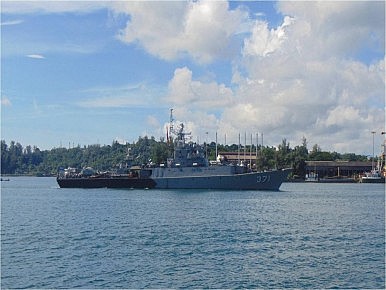What models can Indonesia, Malaysia, and the Philippines follow for their new trilateral maritime cooperation?

Indonesia Navy ship KRI Pattimura entering Port Blair during the Indian–Indonesia Coordinated Patrol (CORPAT).
On May 5, 2016, Indonesia, Malaysia, and the Philippines issued a joint declaration on maritime security as a prompt response to the Abu Sayyaf group’s abducting hostages of various nationalities, including sailors from Indonesia and Malaysia. This agreement is an apt example of the states’ response to the emerging maritime security challenges in the region.
The Celebes Sea has a substantial strategic value as a semi-enclosed sea regulated under the United Nations Convention on the Law of the Sea (UNCLOS), part IX. Its location and potential resources define the strategic importance of the Celebes Sea both for coastal and user states. Unfortunately, the Celebes Sea suffers from a lack of maritime governance since the area has become fertile ground for trans-border illegal activities at sea, including armed robbery against ships, smuggling, and more seriously, facilitating the terrorist nexus at sea. Also, the three littoral states have yet to agree on their maritime boundaries and there is a territorial issue in Sabah involving Malaysia and the Philippines. The dormant issue of Indonesia and Malaysia’s dispute over Ambalat is another crucial challenge.
The joint declaration addresses these issues by highlighting four important measures: conducting patrols; rendering immediate assistance for people and ships in distress; establishing a national focal point; and a communication hotline. It will be interesting to observe the implementation of this declaration. Will the three countries conduct coordinated or joint patrols, or a mix of the two?
The cooperation between Australia and France to tackle Illegal, Unreported, and Unregulated (IUU) Fishing in the Southern Ocean is a good model for joint cooperation. The growing trend of IUU Fishing in the Southern Ocean and the remoteness of the area (4,100 kilometers from Perth) provided two reasons for Australia and France to adopt joint patrols. They signed two treaties in 2003 and 2007 to solve this challenge. The 2003 Treaty covered the area of cooperation, information exchange mechanism, logistics support, cross surveillance with state consent, and, importantly, the continuation of hot pursuit into the other state’s territorial seas. The 2007 Agreement adopted a joint patrol mechanism, defined the role of reciprocal controllers, laid out reporting procedures on enforcement actions, authorized “disruptive measures,” and granted immunity to law enforcement officers. These agreements represent the most complete level of cooperation between states against IUU Fishing.
The common ground of combating IUU Fishing was a crucial enabler for Australian and French cooperation. Similarly, the multifaceted menaces in the Celebes Sea may become strong drivers for littoral states to adopt similar concepts. However, the Australia-France joint patrol mechanism is accommodated through legally binding treaties while the joint declaration by the three countries in the Celebes Sea does not have the same level of legal authority. Joint patrols may require the creation of a stronger legal framework between Indonesia, Malaysia, and the Philippines. Besides, the presence of contested waters in the Celebes Sea and the sensitivity over sovereignty issues may become obstacles to the joint patrol scheme. Nevertheless, relevant articles in UNCLOS–particularly articles 74(3) and 83(3)–could facilitate the states’ adopting enforcement action in contested waters.
Some have suggested adopting the Malacca Strait Sea Patrols (MSSP) as a model for the Celebes Sea area. Indonesia and the Philippines have established a coordinated patrol along their maritime border (CORPAT PHILINDO) on a bilateral basis. The words in the recent joint declaration document advise that the three countries are to maintain the “existing mechanism.” In principle, the three countries are comfortable with the CORPAT approach as an acceptable option under the current circumstances. The drawback is that a coordinated patrol may have limited enforcement access and legal rights inside other states’ territorial waters. For example, the perpetrators may take advantages of the vicinity of the third states’ territorial waters as a safe haven and escape from law enforcement authorities in the case of hot pursuit.
Sustained emerging maritime incidents in the Celebes Sea suggest that the current measures are not adequate. Thus, the littoral states need to enhance the overall condition of maritime security in the area.
The joint declaration is a good initiative to the promotion of peace, stability, and security in the Celebes Sea. Indonesia, Malaysia, and the Philippines should formulate a sound mechanism by collaborating on the best practices and benefits of coordinated and joint patrol operations. The objectives, scope and area of operation, command and control structure, hot pursuit procedures, legal prosecution, and immunity of law enforcement officers are some important elements to be included in the Standard Operating Procedures (SOPs). Essentially, they need to strengthen and intensify their efforts to transform this declaration into effective and practical actions in the Celebes Sea. The tenets of friendship, trust, and unity of effort are critical to the success of this trilateral cooperation.
[Lieutenant Commander Lucky Wuwung is serving as a Surface Warfare Officer in the Indonesia Navy. Currently, he is an international student of Naval Staff College 2016 at the U.S. Naval War College, Newport, Rhode Island, United States. The views expressed here are his own.]
http://thediplomat.com/2016/05/a-quest-for-best-practices-trilateral-cooperation-on-maritime-security-in-the-celebes-sea/

No comments:
Post a Comment
Note: Only a member of this blog may post a comment.